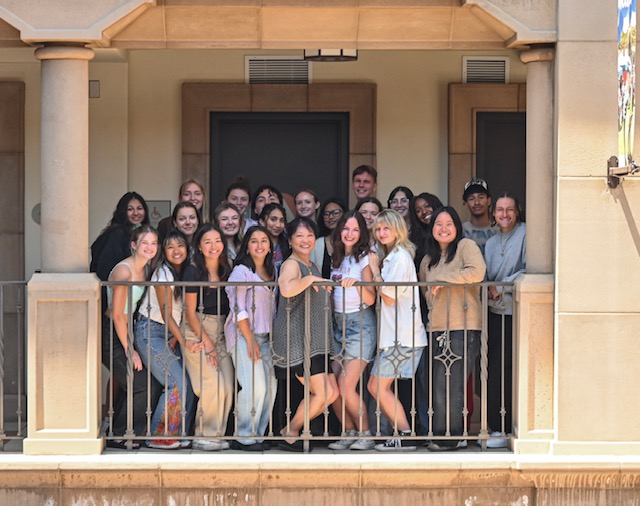SPENCER BISPHAM / MANAGING EDITOR
It’s no secret that our world is becoming more polarized by the minute. In fact, it’s become so toxic that even the most nuanced of concepts can become oversimplified and politicized overnight. The specific concept that hits closest to home for me is gender, specifically what it means to be a man, and why masculinity in general is so fragile at this current moment.
Growing up, I never really questioned my own gender identity. I did many of the things that boys are known to do: played a variety of sports, pretended to hate things that girls liked and took comfort in TV shows like “Ben 10” and “Transformers.” It wasn’t until I got older that I started to notice differences in my personality from those of the other young men around me, namely that I felt more sensitive, emotional and self-conscious. At the time, these were not gendered traits in my head; I just chalked it up to how I was raised by both my parents. They reassured me that these things were just what made me special, that I was just as “normal” as any other guy my age.
I’ve come to love these parts of myself with time, but I also now have a better understanding of why they originally made me feel out of place. Along with sensitivity, empathy and self-awareness, there are a number of personality traits that have been constructed in our society as “feminine.” Being nurturing or patient may also be perceived that way, but so can more negative qualities like irrationality, weakness and general ineptitude. Conversely, there are traits that are characterized as “masculine” too: being strong, independent, hypersexual, stoic and aggressive are just a few examples.
According to the gender schema theory of communication, these traits which are stereotypically thought of as “masculine” or “feminine” are essential parts of how we conceptualize men and women. There are also patterns and behavior we attribute to each group, all of which are typically solidified in our brains by age seven as surmised in cognitive development theory. That’s pretty astounding considering that gender is literally a social construct, and that there are plenty of real, negative implications for such unavoidable ways of thinking. One of these implications is the fragility of masculinity as it relates to our self-esteem.
If you have ever identified as a man (or know anyone who does) you probably know something about the pressure to be masculine in every sense. It’s not just about how you act, but you must also physically embody strength, charisma, humor, etc. in your appearance as well. If you don’t, you run the risk of being perceived as feminine, which has endless negative implications. It’s been proven by the Institute of Labor Economics that there is a real bias for masculine traits over feminine ones in the workforce, but unfortunately it doesn’t stop there. Ask a woman about a time when they felt inadequate, and I promise you’ll see the effects of gender bias reflected in their experiences.
This bias isn’t the only thing which makes masculinity fragile. Recently, there has been a move toward embracing “traditional” masculinity in popular culture, led by voices like Andrew Tate, the Paul brothers, David Goggins and others. It seems that, in their minds, traditional masculinity means embracing stereotypically masculine traits (strength, independence, etc.), in order to become the best version of yourself. It’s the kind of muscle-bound masculinity we see in action movies, TV shows and advertisements, where “manly-men” are the ones moving things forward at the expense of anyone in their way — usually women, or sometimes other men who don’t embrace the same mentality. More than anything it’s exhausting, and a completely antiquated outlook on reality. None of us can be that “hard” all the time, despite every attempt to bury feelings and keep things pushing. We’re not living in the stone age where you might be eaten by a saber tooth tiger at any given moment… it’s okay to take the time to feel your emotions.
Even for those who aren’t clinging to an imagined version of what masculinity should be, it still presents the challenge of exclusion. The queer community exists in the intersection of masculinity/femininity and for many of us, it is the only place we feel safe to explore this contradiction. As The USD Vista contributor Sasha Bukhtiyarova said in her article about defining femininity, “we live in a world of binaries.” Sometimes, it’s necessary to step out of this way of thinking and decide how to embrace gendered qualities for ourselves.
At the end of the day, masculinity will never have a singular definition. Some people would prefer us to present ourselves in ways that fit their gender schema, but unfortunately it’s just not that simple. It makes sense to me that we should instead aim to present ourselves as we wish and adopt the qualities that best suit our needs. People of all genders are capable of accepting traits that fall outside the norm, and at the end of the day it’s nobody’s choice but their own. In the words of the Dutch Poet, Gerard de Malynes: “live and let live.” Or at the very least, live and mind your own business.
Traditionally masculine values, such as strength, reduce men down to their bodies. Photo Courtesy of @zachthemack /Instagram





Leave a comment